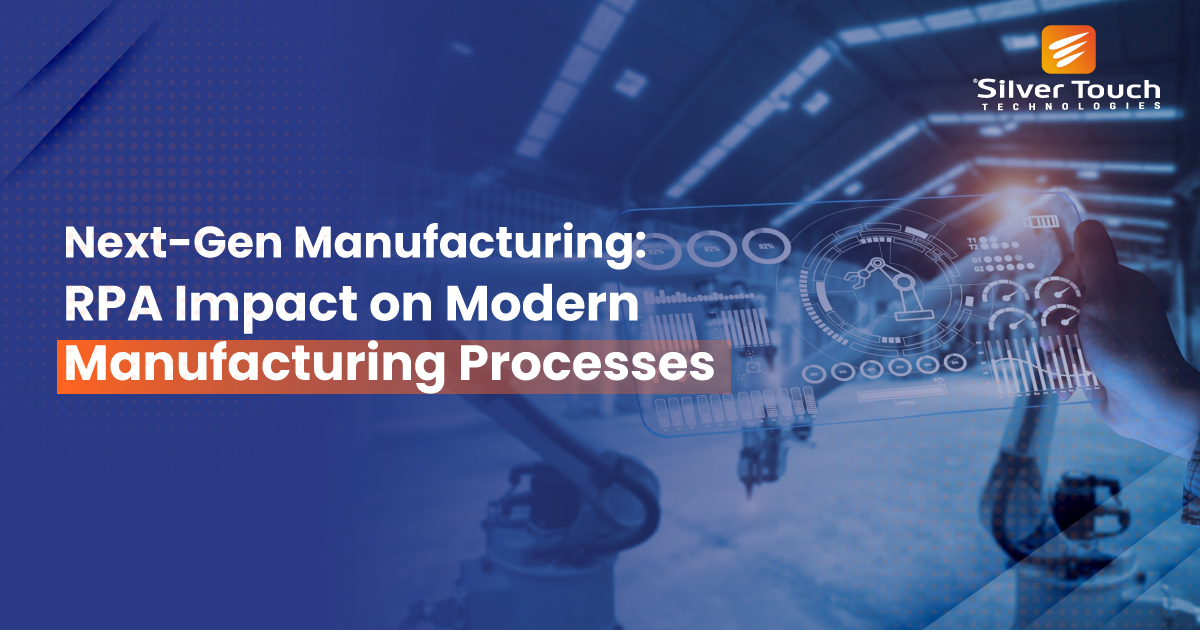Companies belonging to the manufacturing sector come across various challenges from time to time. Apart from economic headwinds, which are beyond the control of the organisations, they often face problems like a shortage of skilled labour, difficulty in tracking inventory levels, supply chain management issues, etc. Addressing all these challenges in order to stay competitive and profitable is a herculean task. Robotic process automation, or RPA in the manufacturing industry, promises to achieve exactly that. RPA is an emerging solution for building and implementing robots. RPA serves as a blessing to the manufacturing industry; it allows companies to improve their productivity and streamline the various processes involved in manufacturing.
As per Deloitte’s Global RPA Survey, 78% of the manufacturing companies that have already implemented RPA expect to increase investment in RPA. This highlights the importance of RPA in present-day businesses.
What is RPA in the Manufacturing Sector?
Robotic process automation, or RPA, in manufacturing, refers to using robots to automate the various tasks related to production and administration within the manufacturing units. The robots are programmed in such a way that they can perform various manual tasks. This helps increase the business efficiency and reduce the chances of error. RPA in manufacturing reduces human dependency and triggers task completion. It contributes to improved quality control and enhanced cost savings within the industry. Overall, the manufacturing process is optimised, and productivity is increased.
How is RPA Used in Manufacturing?
The manufacturing industry has already been using industrial robots for handling materials, assembling parts, welding, and much more. What the industry presently requires is an automated way of managing administrative and procedural tasks, and an RPA perfectly serves the purpose. An RPA in the manufacturing industry handles various tasks like finance, accounting, sales, marketing, HR, customer service, regulatory compliance, and more.
Manufacturers use RPA in manufacturing to simplify any operation with an automation scope. An RPA can be accessed from desktops, laptops, mobile phones, and any other device available. It simplifies complex procedures and offers companies an increased scope of scalability. Over the years, RPA solutions have undergone huge improvements and modifications. Today, an RPA can be tailored to suit the exact business needs.
Key Benefits of RPA in the Manufacturing Industry
The key to leveraging benefits from RPA in the manufacturing industry, or for that matter, in any sector, is to analyse the problems and objectives first. Once that is done, driving success with RPA just becomes a matter of time.
Increased Productivity
RPA automates various repetitive manual tasks within the manufacturing sector. So, the human workers can put their focus on the various core business activities. This helps increase the organisation’s overall productivity. The resources within the organisation are put to good use.
Cost Savings
With an RPA solution, companies are able to cut down on manual labour and reduce operational costs easily. The resource allocation requirements are reduced, leading to cost-cutting. An RPA also saves companies from paying expensive fines because of compliance issues.
Enhanced Quality Control
The jobs performed by RPA processes are error-free, which is impossible in human-driven systems. The outcome is always consistent. This again leads to reduced chances of defects and increased quality. Using an RPA, quality control measures are implemented within the business unit.
Scalability
This is one of the biggest benefits of RPA in manufacturing. The RPA solutions are flexible enough. They are scaled as per business requirements. All the necessary changes can be made to the RPA to accommodate changes in business needs. This makes it a highly reliable solution for businesses subjected to frequent changes.
Improved Accuracy
Manual processes are easily prone to errors. These errors become costly for businesses. With automation, the chances of mistakes are reduced. There are no chances of faulty outputs in an RPA. As a result, the level of accuracy improves.
Inventory Management
Automation in inventory management prevents overstocking and understocking of products. The stock levels are easily optimised, offering customers a better experience. A proper balance is also maintained between demand and supply.
Improved Job Satisfaction
As RPA prevents employees from performing mundane tasks, their level of satisfaction increases. They want to remain attached to the organisation for a long time. Their loyalty towards the company increases when they see that their efforts are being put to good use.
Enhanced Regulatory Compliance
RPA ensures that the various processes comply with industrial standards, thereby reducing the risk of non-compliance. The companies save themselves from paying heavy fines because of non-compliance issues.
An RPA system is not dependent on coding activities. Hence, it can integrate easily into the existing business system, enabling the organisation to embark on its digital transformation journey quickly.
Top 6 RPA Use Cases in Manufacturing
Following are some of the most important functions for which RPA is used in the manufacturing sector:
Purchase Order Creation
Purchase orders are an integral part of manufacturing companies. A lot of time and effort is spent each day preparing the purchase orders. Creating POs becomes all the more complex when the companies offer different ranges of products to the customer. RPA in manufacturing makes the purchase order creation process simple and easy. It uses predefined workflows to generate purchase orders. The workflow performs various operations like gathering data, acquiring approvals, etc, making the purchase order creation process quick and easy.
Inventory Management
Managing inventories is again an important task for manufacturing companies. Adequate inventory levels help ensure that customer demands are met accurately. Inventory tracking and management prevent understocking and overstocking of products. However, managing inventories manually is a difficult affair. It requires a dedicated group of resources. A lot of time is spent in the process. An RPA in the manufacturing industry monitors the stock levels in real time. It tracks the deliveries and generates a timely report. So a clear view of the inventory is obtained. The RPA also generates notifications on replenishing stocks.
Bill of Materials (BOM):
Bill of Materials serves as the handbook for manufacturing businesses. It contains detailed information on product manufacturing, including the raw materials required, quantities of each raw material, the number of resources required, the components and sub-components required to be designed, and guidelines for designing, assembling, and packaging the end products. RPA enables the storage of BOM data on the cloud. It helps in making standard templates for designing new BOMs. It also generates alerts for missing components and picks alternate components from the available database to ensure smooth production.
Invoice Processing
Companies in the manufacturing units spend hours processing invoices. Invoice processing serves as one of the most important aspects of manufacturing businesses. For a business to succeed, proper invoices will have to be generated. Invoice processing is a rule-based process, which is why it has enhanced scope for automation. The RPA takes care of different processes related to invoice generation, like extracting data, matching purchase orders with invoices, generating receivables, removing duplicate records, and updating the records regularly. This enhances business accuracy and improves the company’s reputation.
Customer Service
Manufacturing companies need to ensure that proper service is offered to their customers, which an RPA solution can easily take care of. RPA solutions come with enhanced bot features that provide a first-level response to customers, making them feel valued and heard. The chatbots work during non-working hours as well. RPA also automates email responses, which reduces the waiting period for customers. The customers are really happy with the level of service being offered. They are more driven towards the organisation.
Supply Chain Management
RPA helps with every single aspect of supply chain management. It automates the supplier onboarding process, predicts market demands, and helps manage raw materials. RPA gathers valuable data from the vendors and performs credibility checks. This helps in the vendor selection process. RPA solutions are also quite effective in handling various back-office processes like scheduling meetings, recording attendance, etc.
Why Automation is Crucial for D2C Manufacturers?
The D2C manufacturers must keep themselves updated with the latest industrial trends to survive in the world of cut-throat competition. By implementing automation, they easily gain a competitive edge and keep themselves above the crowd. Automation also offers D2C manufacturers the scope to fulfil their responsibilities. They no longer have to spend their time on repetitive tasks and deal with challenges concerning human errors.
An RPA system, when planned and implemented properly, lowers the chances of errors. It improves the speed of the process and saves human efforts. As a result, business accuracy is maintained, and productivity is increased. The production schedules are managed efficiently, and the inventory levels are handled easily. The business owners also use an RPA to design marketing campaigns to reach new customers. There are various other RPA examples in manufacturing as well that are highly beneficial to D2C manufacturers.78% of the manufacturing companies
Build Powerful RPA Solutions with SilverTouch
To implement RPA in manufacturing, enterprises should contact experienced service providers like Silver Touch. They will guide them in their complete digital transformation journey. The RPA solution designed by the automation experts at Silver Touch will place the company on a growth path and revolutionise its business processes, thereby adding an excellent competitive edge. SilverTouch has years of experience working in the manufacturing industry. So, they will develop solutions that directly align with the business needs.
How Can SilverTouch Help Businesses With RPA Implementation?
The professionals at SilverTouch Technologies will consider the exact business needs and implement highly advanced solutions that will meet the demands of the customers. They will carefully understand the nature of the business and hold regular meetings to know the expectations of the customers from the RPA solution. They will then design the RPA system effectively. Companies can also rely on the SilverTouch experts to seamlessly integrate the RPA solution into their existing system. This will reduce business downtime and help maintain workplace efficiency.
Ready to Get Started with Manufacturing Automation? Schedule a Free Demo with Us!
Conclusion About RPA in Manufacturing Industry
Over the years, there has been an increased demand for RPA in manufacturing. In fact, the global RPA in manufacturing market size will reach USD 7.60 billion in 2021, and it is currently expanding at a CAGR of 33.2%. Proper RPA implementation can completely change the way a business operates. It saves time and effort and cuts down on operational costs. With RPA driving the manufacturing sectors, it has become all the more important for companies in the sector to look for a reliable RPA implementation partner who can help implement RPA in their existing business environment. So, to experience the benefits of RPA in the manufacturing industry, contact the professionals at SilverTouch Technologies and avail of their services.
FAQs on RPA in Manufacturing Industry
An RPA automates tasks like order processing, inventory management, preparing invoices and purchase orders, etc.


